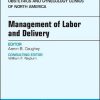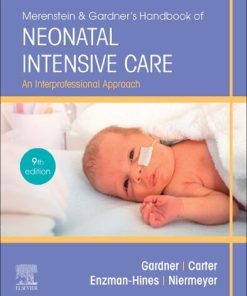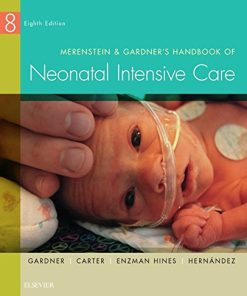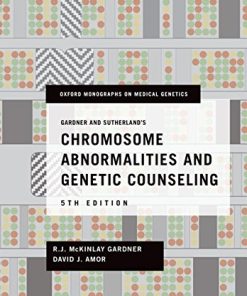(Ebook PDF) Merenstein and Gardners Handbook of Neonatal Intensive Care 8th Edition by Sandra Lee Gardner, Brian Carter, Mary Enzman Hines, Jacinto Hernandez ISBN 9780323320849 0323320848 full chapters
$50.00 Original price was: $50.00.$25.00Current price is: $25.00.
(Ebook PDF) Merenstein & Gardner’s Handbook of Neonatal Intensive Care 8th Edition by Sandra Lee Gardner, Brian Carter, Mary Enzman Hines, Jacinto Hernandez-Ebook PDF Instant Download/Delivery:9780323320849, 0323320848
Instant download Full Chapter of Merenstein & Gardner’s Handbook of Neonatal Intensive Care 8th Editio after payment
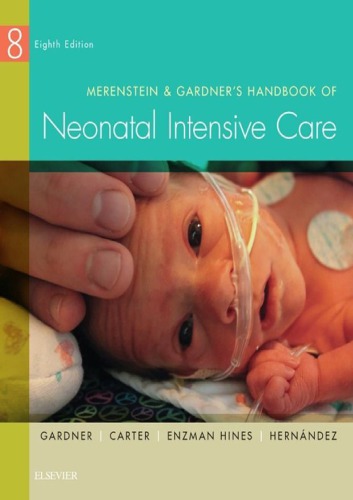
Product details:
ISBN 10:0323320848
ISBN 13:9780323320849
Author: Sandra Lee Gardner, Brian S. Carter, Mary I Enzman-Hines, Jacinto A. Hernandez
Merenstein & Gardner’s Handbook of Neonatal Intensive Care, 8th Edition, is the leading resource for collaborative, interprofessional critical care of newborns. Co-authored by physicians and nurses, it offers concise, comprehensive coverage with a unique multidisciplinary approach and real-world perspective that make it an essential guide for both neonatal nurses and physicians. The 8th edition features the latest neonatal research, evidence, clinical guidelines, and practice recommendations — all in a practical quick-reference format for easy retrieval and review of key information.
Table of Contents:
- Introduction
- Unit One. Evidence-Based Practice
- 1. Evidence-Based Clinical Practice
- Finding High-Quality Evidence
- Pressures to Intervene
- Evaluation of Therapies
- Qualitative Research Evaluating Experiences in the Neonatal Intensive Care Unit
- Systematic Review in Perinatal Care and Evidence-Based Practice
- Translating Evidence into Practice
- Clinical Practice Guidelines
- Unit Two. Support of the Neonate
- 2. Prenatal Environment: Effect on Neonatal Outcome
- Physiology
- Compromised Fetal Environment
- Environmental Effects of Labor on the Fetus
- Assessment of Fetal Well-Being
- 3. Perinatal Transport and Levels of Care
- Regional Perinatal Referral and Transport System
- Neonatal Transport
- Family-Centered Care for Transport
- Future of Neonatal Transport
- 4. Delivery Room Care
- A Golden Opportunity
- Physiology
- Asphyxia and Apnea
- Clamping of the Umbilical Cord
- Resuscitation of the Newborn
- Delivery Room Emergencies
- Care During the Transition from the Delivery Room to the Nursery
- Care of the Family and Perinatal Decision Making
- 5. Initial Nursery Care
- Assessment and Care at Delivery
- Evaluation and Care During the Transitional Period
- Physical Assessment of the Newborn
- Late-Preterm Infant
- Care of the Well Newborn Infant
- Parent Teaching
- 6. Heat Balance
- Historical Milestones
- Physiologic Considerations
- Etiology of Heat Imbalances
- Prevention of Heat/Cold Stress
- Data Collection
- Hypothermia
- Hyperthermia
- Parent Teaching
- 7. Physiologic Monitoring
- Physiology
- Noninvasive Monitoring
- Data Collection
- Interventions
- Complications
- Controversies
- Parent Teaching
- 8. Acid-Base Homeostasis and Oxygenation
- Physiology
- Data Collection
- Treatment
- Complications
- 9. Diagnostic Imaging in the Neonate
- Radiography
- Fluoroscopy
- Ultrasonography
- Computed Tomography
- Magnetic Resonance Imaging
- Nuclear Scintigraphy
- Positron Emission Tomography
- Interventional Radiology
- Picture Archiving and Communication Systems
- Family Education and Involvement
- 10. Pharmacology in Neonatal Care
- Physiology
- Data Collection
- Drug Categories
- Prevention of Therapeutic Mishaps
- Methods of Administration
- Parent Teaching
- 11. Drug Withdrawal in the Neonate
- Physiology
- Etiology of Neonatal Abstinence Syndrome
- Prevention
- Diagnosis
- Treatment and Intervention
- Parent Teaching
- 12. Pain and Pain Relief
- Physiology and Pathophysiology
- Neuroanatomy
- Physiologic Responses
- Etiology
- Prevention
- Data Collection
- Treatment
- End-of-Life Care
- Complications
- Parent Teaching
- 13. The Neonate and the Environment: Impact on Development
- Developmental Tasks of the Neonate and Infant
- Endowment
- Environment
- Interventions
- Unit Three. Metabolic and Nutritional Care of the Neonate
- 14. Fluid and Electrolyte Management
- Physiology
- Etiology
- Prevention
- Data Collection
- Treatment
- Complications
- Parent Teaching
- 15. Glucose Homeostasis
- Fetal Physiology
- Neonatal Physiology
- Hypoglycemia
- Hyperglycemia
- Etiology of Hypoglycemia and Hyperglycemia
- Prevention of Hypoglycemia and Hyperglycemia
- Data Collection
- Treatment
- Complications
- Parent Teaching
- 16. Total Parenteral Nutrition
- Physiology
- Indications
- Data Collection
- Treatment
- Complications
- Parent Teaching
- 17. Enteral Nutrition
- Physiology
- Nutritional Requirements
- Composition of Enteral Feedings
- Feeding Techniques
- Feeding Intolerance and Complications
- The Preterm Infant
- The Intrauterine Growth–Restricted Infant
- Changes in Nutritional Requirements with Illness
- Developmental Support
- Family Support
- Feeding the Preterm Infant After Hospital Discharge
- 18. Breastfeeding the Neonate with Special Needs
- Physiology of Breastfeeding
- Psychologic Values of Breastfeeding
- Facilitating Successful Breastfeeding
- Prevention of Breastfeeding Problems
- Data Collection and Intervention
- Complications of Breastfeeding
- Parent Teaching
- 19. Skin and Skin Care
- Physiology
- Etiology
- Prevention
- Data Collection
- Treatment
- Complications
- Parent Teaching
- Unit Four. Infection and Hematologic Diseases of the Neonate
- 20. Newborn Hematology
- Red Blood Cells
- Polycythemia and Hyperviscosity
- Coagulation
- Thrombosis
- White Blood Cells
- 21. Neonatal Hyperbilirubinemia
- Pathophysiology
- Etiology of Hyperbilirubinemia
- Mechanisms of Bilirubin Neurotoxicity
- Prevention of Hyperbilirubinemia
- Evaluation of the Infant with Hyperbilirubinemia
- Treatment
- Parent Teaching
- Health Systems Approach to Bilirubin
- 22. Infection in the Neonate
- Pathophysiology and Pathogenesis
- Etiology
- Specific Infectious Diseases
- Parent Teaching
- Unit Five. Common Systemic Diseases of the Neonate
- 23. Respiratory Diseases
- General Physiology
- General Etiologic Factors
- General Prevention
- General Data Collection
- General Treatment Strategies
- General Complications
- Parent Teaching
- 24. Cardiovascular Diseases and Surgical Interventions
- Congenital Heart Disease: Overview
- Specific Conditions
- Parent Teaching
- Future Research
- 25. Neonatal Nephrology
- Normal Development
- Clinical Assessment of Renal Disease in the Neonate
- Acute Kidney Injury
- Intrinsic Renal Parenchymal Abnormalities
- Renal Vein Thrombosis
- Hydronephrosis
- Hypertension
- Abdominal Masses
- Renal Tubular Disorders
- Urinary Tract Infection
- Neurogenic Bladder
- Nephrocalcinosis and Nephrolithiasis
- Chronic Renal Failure
- Nursing Care of the Neonate with Renal Failure
- 26. Neurologic Disorders
- Congenital Malformations
- Birth Injuries
- Specific Birth Injuries
- Hypotonia
- Neonatal Seizures
- Hypoxic-Ischemic Encephalopathy
- Intraventricular Hemorrhage
- Pediatric Stroke
- 27. Genetic Disorders, Malformations, and Inborn Errors of Metabolism
- Genetic Principles
- Etiology
- Data Collection
- Treatment and Intervention
- The Human Genome Project
- Parent Teaching
- 28. Neonatal Surgery
- Diaphragmatic Hernia
- Esophageal Atresia and Tracheoesophageal Fistula
- Congenital Chest Masses
- Intestinal Malrotation and Volvulus
- Intestinal Atresia
- Necrotizing Enterocolitis
- Meconium Ileus
- Hirschsprung’s Disease
- Anorectal Malformations
- Omphalocele and Gastroschisis
- Neonatal Tumors
- Minimally Invasive Surgery
- Parent Teaching
- Unit Six. Psychosocial Aspects of Neonatal Care
- 29. Families in Crisis: Theoretical and Practical Considerations
- Normal Attachment
- Psychologic Adjustments to a Sick Newborn
- Communicating Medical Information: Evidence-Based Practice
- Postpartum Mood Disorders
- Adaptation to the Intensive Care Environment
- 30. Grief and Perinatal Loss
- The Grief Process
- Perinatal Situations in Which Grief is Expected
- Stages of Grief
- Symptoms of Grief
- Male–Female Differences
- Timing of Grief Resolution
- Interventions
- Children and Grief
- Pathologic Grief
- 31. Discharge Planning and Follow-Up of the Neonatal Intensive Care Unit Infant
- Planning for Discharge
- Neurodevelopmental Follow-Up of High-Risk Infants
- Complex Disorders of Brain Development
- Perinatal Risk Factors for Neurodevelopmental Impairments
- Specific Neurodevelopmental Outcomes
- Tracking Health Outcomes: the Primary Care Provider
- Long-Term Neurodevelopmental Follow-Up
- 32. Ethics, Values, and Palliative Care in Neonatal Intensive Care
- Historical Overview
- Definition of Bioethics
- Theories of Ethics
- Clinical Dilemmas in the Neonatal Intensive Care Unit
- Decision Making in the Neonatal Intensive Care Unit
- Ethics Committee or Palliative Care Consultation?
- Communicating with Families
- Palliative Care in the Intensive Care Setting
- Social Ethics
- Glossary
- Index
- Newborn Metric Conversion Tables (Cont’d)
People also search:
handbook of neonatal intensive care 9th edition
handbook of neonatal intensive care
neonatal intensive care book pdf
neonatal intensive care nursing 6th edition
neonatal intensive care book
Tags:
Merenstein,Gardners,Neonatal Intensive Care
You may also like…
Medicine - Anesthesiology and Intensive Care
Romance - Contemporary Romance
Jock Seeks Geek: The Holidates Series Book #26 Jill Brashear
Uncategorized
Merenstein & Gardner’s Handbook of Neonatal Intensive Care E Book 8th Edition, (Ebook PDF)
Uncategorized
Arts - Graphic Arts



